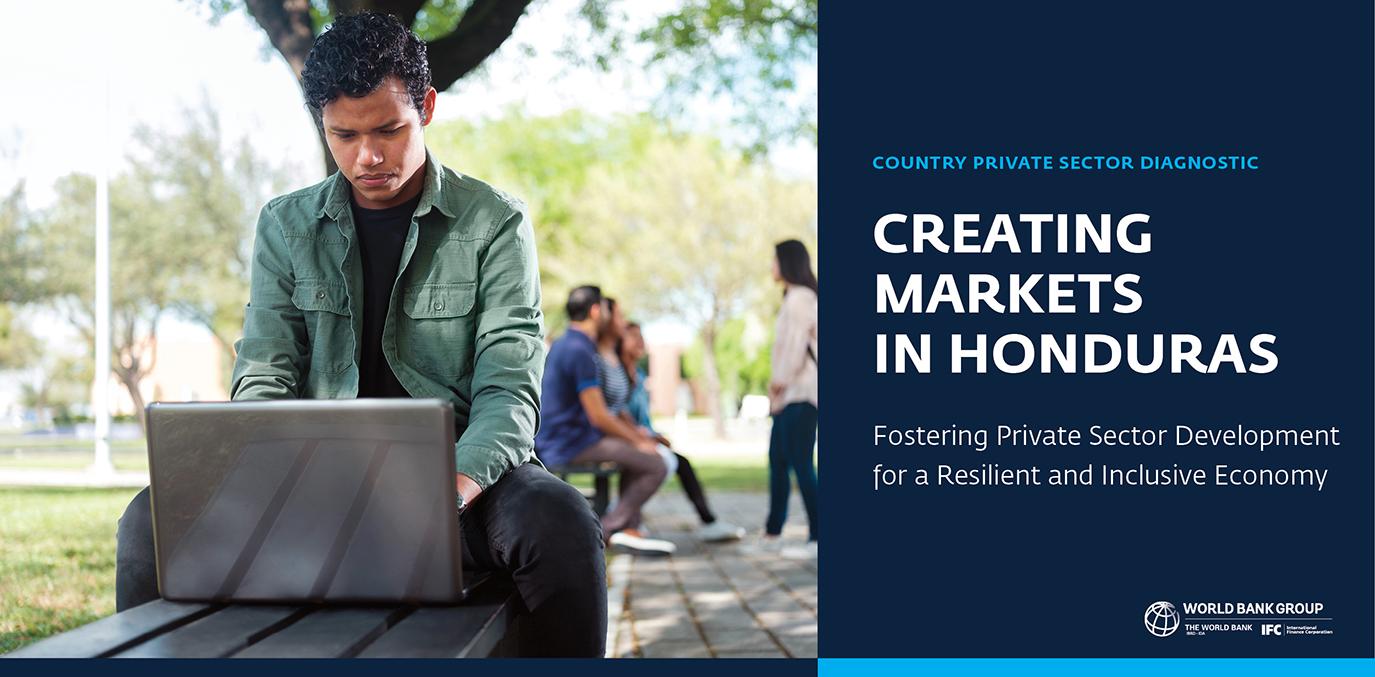
Honduras has significant investment potential. Addressing key constraints can accelerate economic recovery, create jobs and diversify exports, including lowering production costs, developing human and physical capital, and strengthening governance and business environment
Tegucigalpa, Honduras, May 18, 2022 - Honduras can advance reforms to improve its business climate and foster more private-sector development in key economic sectors to accelerate inclusive growth and create more diverse and sophisticated markets with high-quality jobs, according to a new report published by the World Bank Group.
The World Bank and the International Finance Corporation (IFC) released the Honduras Country Private Sector Diagnostic (CPSD) – first of this kind in Central America – a study that analyzes opportunities in key economic sectors where more private sector participation could have a significant development impact, while identifying policy reforms and actions for the next five years to address key constraints for enterprises, to help lower production costs, build capital and strengthen governance.
"The private sector has a leading role in the effort to boost inclusive economic growth and the CPSD aims to help guide Honduras in better leveraging the key industries that can attract investments, diversify exports, create jobs and accelerate economic recovery," said Sanaa Abouzaid, IFC Manager for Central America.
The four sectors studied by the CPSD are i) agribusiness, ii) light manufacturing, iii) business-process outsourcing (BPO) and iv) digital financial services (DFS) for micro, small and medium enterprises MSMEs. All four sectors have significant potential to drive growth, increase value-added and productivity, create jobs and contribute to export diversification in Honduras.
1. Agriculture is a key pillar of the Honduran economy, employing around 30% of the country's total labor force, and agricultural exports represent more than 70% of total exports by value. The sector could generate more jobs and increase income by diversifying beyond traditional goods and exports and increasing access to finance for small farmers.
2. Light manufacturing in Honduras -mainly garment, electronics and automobile wire assembly- has a strong competitive advantage based on an established industrial base and a strong potential to move into more complex, higher value-added products. The development of eco-friendly solutions can also be a source of competitive advantage.
3. BPO is growing in Honduras at an average rate of 8-10% per year and has the potential to harness Honduras demographic dividend, create jobs and contribute to export diversification by transitioning to higher value outsourcing services, including software development, information security, business analytics, and social media production and management.
4. Increasing digital financial services for MSMEs -which employ about 70% of the workforce and generate 50% of GDP- would allow them access to credit to invest safely and efficiently, at lower costs; while giving financial institutions the opportunity to widen their reach in this segment.
"The CPSD highlights how important reducing informality, improving productivity and increasing access to finance for small producers and MSMEs will generate more jobs and increase incomes for workers, firms and families. The Honduras CPSD, prepared by a joint World Bank-IFC team and the first one in the Central American region, focuses on supporting the private sector to enable more resilient and inclusive economic growth," said Boris Weber, World Bank Resident Representative for Honduras.
The CPSD identifies near-term reforms and actions to address the country's relatively high production costs due to expensive electricity supply, complex tax policies and burdensome procedures, among others. Policy changes can also help develop human and physical capital, broaden access to credit for MSMEs, strengthen governance and business environment, and develop adequate infrastructure, especially roads, public utilities, payment infrastructure, and broadband services.
About the Country Private Sector Diagnostic (CPSD)
The World Bank Group's Country Private Sector Diagnostics aims to identify sectors where private sector solutions can create or expand markets and make substantial contributions to development impact. The diagnostics use a structured approach to analyze key sectors with unrealized private sector potential in each country, select several sectors for deeper analysis, and make recommendations for policy action. The sector analyses, conducted with significant input from teams across the World Bank Group and from external partners including governments, provide valuable information on the challenges and opportunities to better leverage the private sector to achieve developmental objectives. The CPSD aligns with the World Bank Group's Maximizing Finance for Development (MFD) approach, which looks to private sector solutions to reach the 2030 Sustainable Development Goals.
About the World Bank
The World Bank provides financing, global knowledge, and long-term commitment to help low- and middle-income countries end poverty, achieve sustainable growth, and invest in opportunity for all. We comprise the International Bank for Reconstruction and Development (IBRD), the world's largest development bank, and the International Development Association (IDA), one of the largest sources of funding for the world's poorest countries. With the other World Bank Group institutions as well as partners across the public and private sectors, we are helping build solutions to the global challenges of the 21st century in all major sectors of development. A world where no one lives in poverty and everyone has the opportunity for a better life is within our reach.
About IFC
IFC —a member of the World Bank Group— is the largest global development institution focused on the private sector in emerging markets. We work in more than 100 countries, using our capital, expertise, and influence to create markets and opportunities in developing countries. In fiscal year 2021, IFC committed a record $31.5 billion to private companies and financial institutions in developing countries, leveraging the power of the private sector to end extreme poverty and boost shared prosperity as economies grapple with the impacts of the COVID-19 pandemic. For more information, visit www.ifc.org.
Contacts
Mónica De León
+1(202) 855-8476
mdeleonmartin@ifc.org
Stay Informed
Sign up to have customizable news & updates sent to you.